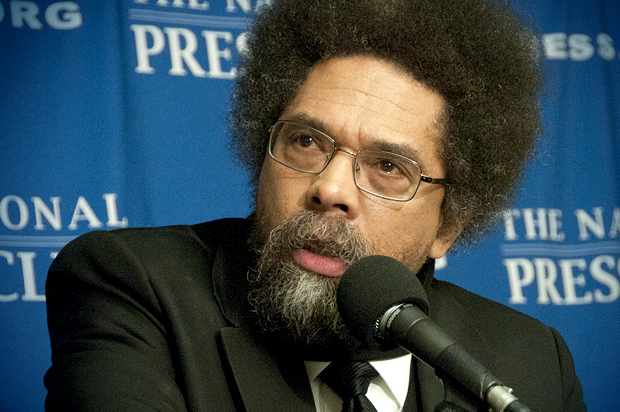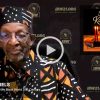Cornel West is a professor at Union Theological Seminary and one of my favorite public intellectuals, a man who deals in penetrating analyses of current events, expressed in a pithy and highly quotable way.
I first met him nearly six years ago, while the financial crisis and the presidential election were both under way, and I was much impressed by what he had to say. I got back in touch with him last week, to see how he assesses the nation’s progress since then.
The conversation ranged from Washington, D.C., to Ferguson, Missouri, and although the picture of the nation was sometimes bleak, our talk ended on a surprising note.
Last time we talked it was almost six years ago. It was a panel discussion The New Yorker magazine had set up, it was in the fall of 2008, so it was while the financial crisis was happening, while it was actually in progress. The economy was crumbling and everybody was panicking. I remember you speaking about the financial crisis in a way that I thought made sense. There was a lot of confusion at the time. People didn’t know where to turn or what was going on.
I also remember, and this is just me I’m talking about, being impressed by Barack Obama who was running for president at the time. I don’t know if you and I talked about him on that occasion. But at the time, I sometimes thought that he looked like he had what this country needed.
So that’s my first question, it’s a lot of ground to cover but how do you feel things have worked out since then, both with the economy and with this president? That was a huge turning point, that moment in 2008, and my own feeling is that we didn’t turn.
No, the thing is he posed as a progressive and turned out to be counterfeit. We ended up with a Wall Street presidency, a drone presidency, a national security presidency. The torturers go free. The Wall Street executives go free. The war crimes in the Middle East, especially now in Gaza, the war criminals go free. And yet, you know, he acted as if he was both a progressive and as if he was concerned about the issues of serious injustice and inequality and it turned out that he’s just another neoliberal centrist with a smile and with a nice rhetorical flair. And that’s a very sad moment in the history of the nation because we are—we’re an empire in decline. Our culture is in increasing decay. Our school systems are in deep trouble. Our political system is dysfunctional. Our leaders are more and more bought off with legalized bribery and normalized corruption in Congress and too much of our civil life. You would think that we needed somebody—a Lincoln-like figure who could revive some democratic spirit and democratic possibility.
That’s exactly what everyone was saying at the time.
That’s right. That’s true. It was like, “We finally got somebody who can help us turn the corner.” And he posed as if he was a kind of Lincoln.
Yeah. That’s what everyone was saying.
And we ended up with a brown-faced Clinton. Another opportunist. Another neoliberal opportunist. It’s like, “Oh, no, don’t tell me that!” I tell you this, because I got hit hard years ago, but everywhere I go now, it’s “Brother West, I see what you were saying. Brother West, you were right. Your language was harsh and it was difficult to take, but you turned out to be absolutely right.” And, of course with Ferguson, you get it reconfirmed even among the people within his own circle now, you see. It’s a sad thing. It’s like you’re looking for John Coltrane and you get Kenny G in brown skin.
When you say you got hit hard, are you talking about the personal confrontation you had with him?
I’m just thinking about the vicious attacks of the Obama cheerleaders.
The personal confrontation you had with him is kind of famous. He got angry at you because you were saying he wasn’t progressive enough.
I just looked at him like “C’mon, man. Let the facts speak for themselves. I’m not into this rhetorical exchange.”
Is there anybody who thinks he’s progressive enough today?
Nobody I know. Not even among the progressive liberals. Nobody I know. Part of this, as you can imagine, is that early on there was a strong private-public distinction. People would come to me and say privately, “We see what you’re saying. We think you’re too harsh in how you say it but we agree very much with what you’re saying in private.” In public, no comment. Now, more and more of it spills over in public.
There’s a lot of disillusionment now. My liberal friends included. The phrase that I have heard from more than one person in the last year is they feel like they got played.
That’s true. That’s exactly right. What I hear is that, “He pimped us.” I heard that a zillion times. “He pimped us, brother West.” That’s another way of saying “we got played.”
You remember that enthusiasm in 2008. I’m from Kansas City. He came and spoke in Kansas City and 75,000 people came to see him.
Oh yeah. Well we know there were moments in Portland, Oregon, there were moments in Seattle. He had the country in the palm of his hand in terms of progressive possibilities.
What on earth ails the man? Why can’t he fight the Republicans? Why does he need to seek a grand bargain?
I think Obama, his modus operandi going all the way back to when he was head of the [Harvard] Law Review, first editor of the Law Review and didn’t have a piece in the Law Review. He was chosen because he always occupied the middle ground. He doesn’t realize that a great leader, a statesperson, doesn’t just occupy middle ground. They occupy higher ground or the moral ground or even sometimes the holy ground. But the middle ground is not the place to go if you’re going to show courage and vision. And I think that’s his modus operandi. He always moves to the middle ground. It turned out that historically, this was not a moment for a middle-ground politician. We needed a high-ground statesperson and it’s clear now he’s not the one.
And so what did he do? Every time you’re headed toward middle ground what do you do? You go straight to the establishment and reassure them that you’re not too radical, and try to convince them that you are very much one of them so you end up with a John Brennan, architect of torture [as CIA Director]. Torturers go free but they’re real patriots so we can let them go free. The rule of law doesn’t mean anything.
The rule of law, oh my God. There’s one law for us and another law if you work on Wall Street.
That’s exactly right. Even with [Attorney General] Eric Holder. Eric Holder won’t touch the Wall Street executives; they’re his friends. He might charge them some money. They want to celebrate. This money is just a tax write-off for these people. There’s no accountability. No answerability. No responsibility that these people have to take at all. The same is true with the Robert Rubin crowd. Obama comes in, he’s got all this populist rhetoric which is wonderful, progressive populist rhetoric which we needed badly. What does he do, goes straight to the Robert Rubin crowd and here comes Larry Summers, here comes Tim Geithner, we can go on and on and on, and he allows them to run things. You see it in the Suskind book, The Confidence Men. These guys are running things, and these are neoliberal, deregulating free marketeers—and poverty is not even an afterthought for them.
They’re the same ones who screwed it up before.
Absolutely.
That was the worst moment [when he brought in the Rubin protégés].
We tried to point that out as soon as he became part of the Rubin stable, part of the Rubin group, and people didn’t want to hear it for the most part. They didn’t want to hear it.
Now it’s six years later and the search for the Grand Bargain has been fruitless. Why does he persist? I shouldn’t be asking you to psychologize him…
I think part of it is just temperament. That his success has been predicated on finding that middle ground. “We’re not black. We’re not white. We’re not rich. We’re not poor. There’s no classes in America. We are all Americans. We’re the American family.” He invoked the American family last week. It’s a lie, brother. You’ve got to be able to tell the truth to the American people. We’re not a family. We’re a people. We’re a nation. And a nation always has divisions. You have to be able to speak to those divisions in such a way that, like FDR, like Lincoln, you’re able to somehow pull out the best of who we are, given the divisions. You don’t try to act as if we have no divisions and we’re just an American family, with the poor getting treated in disgraceful ways and the rich walking off sipping tea, with no accountability at all, and your foreign policy is running amok with Israelis committing war crimes against precious Palestinians and you won’t say a mumbling word about the Palestinian children. What is history going to say about you? Counterfeit! That’s what they’ll say, counterfeit. Not the real thing.
Let’s talk about Ferguson. All I know about it is what I’ve been reading in the newspapers; I haven’t been out there. But I feel like there’s a lot more going on there than this one tragic killing.
Oh, absolutely. I mean, one, we know that this is a systemic thing. This thing has been going on—we can hardly get a word out of the administration in terms of the arbitrary police power. I’ll give you a good example: Carl Dix and I, three years ago, we went to jail over stop and frisk. We had a week-long trial and we were convicted, we were guilty. While the trial was going on, President Obama came into New York and said two things: He said that Michael Bloomberg was a terrific mayor even though he had stopped and frisked over four and a half million since 2002. Then he went onto say that Ed Koch was one of the greatest mayors in the last 50 years. This is right at a time when we’re dealing with stop and frisk, arbitrary police power, and Bloomberg is extending stop and frisk and proud of it. At least Bloomberg is honest about it. Bill De Blasio is just trying to walk a tightrope in this regard. At least Bloomberg was honest about it. He was glad that stop and frisk was in place. When we went to jail he said, “Y’all are wrong. If stop and frisk is stopped, then crime is going to go up…”
I just give you that as an example in terms of arbitrary police power because in Ferguson we’re talking about arbitrary police power, and this particular instance of it has been going on for a long time. The Obama administration has been silent. Completely silent. All of a sudden now, you get this uprising and what is the response? Well, as we know, you send out a statement on the death of brother Robin Williams before you sent out a statement on brother Michael Brown. The family asked for an autopsy at the Federal level, they hold back, so they [the family] have to go and get their own autopsy, and then the federal government finally responds. [Obama] sends Eric, Eric’s on the way out. Eric Holder’s going to be gone by December.
Oh, is he?
Yeah, he’s already said, this is it. He’s concerned about his legacy as if he’s somehow been swinging for black folk ever since he’s been in there. That’s a lie. He’s been silent, too. He’s been relatively silent. He’s made a couple of gestures in regards to the New Jim Crow and the prison-industrial complex, but that’s just lately, on his way out. He was there for six years and didn’t do nothing. See what I mean?
I see exactly what you mean, but I look at the pictures at Ferguson and it looks like it could be anywhere in America, you know.
Absolutely. It looks like it could be New York, Chicago, Atlanta, L.A. It’s like they’re lucky that it hasn’t hit New York, Chicago, L.A. yet, you know.
When they rolled out the militarized police, it frightened people. Something is going on here. It’s not breaking down the way it usually does. People are reacting to this in a different way.
That’s true. It’s a great moment, but let me tell you this though. Because what happens is you got Eric Holder going in trying to create the calm. But you also got Al Sharpton. And when you say the name Al Sharpton, the word integrity does not come to mind. So you got low-quality black leadership. Al Sharpton is who? He’s a cheerleader for Obama.
I haven’t followed him for years; I didn’t know that.
He meets with the president regularly.
I did not know that.
On his show on MSNBC…
I knew he had a show, I just…I guess I don’t watch it enough.
You gotta check that out, brother.
That’s the problem with me, I don’t watch enough TV.
It’s probably good for your soul but you still have to be informed about how decadent things are out here. But, no: MSNBC, state press, it’s all Obama propaganda, and Sharpton is the worst. Sharpton said explicitly, I will never say a critical word about the president under any condition. That’s why he can’t stand what I’m saying. He can’t stand what I do because, for him, it’s an act of racial traitorship to be critical of the president. There’s no prophetic integrity in his leadership.
I understand that. I think a lot of people feel that way. Not just in a racial sense but because Obama’s a Democrat. People feel that way in a partisan sense.
I think that’s true too. You have had some Democrats who’ve had some criticisms of the president. You’ve got some senator that has been critical about his violation of civil liberties and so forth, and rightly so. But Sharpton, and I mention Sharpton because Sharpton is the major black leader who is called on to deal with arbitrary police power. So, Trayvon Martin, what did he do? You got all this black rage down there calling for justice. Has there been justice for Trayvon Martin? Has the Department of Justice done anything for the Trayvon Martin case? None whatsoever. The same is true now with Ferguson. They call Sharpton down. He poses, he postures like he’s so radical. But he is a cheerleader for the Obama administration which means, he’s going to do what he can to filter that rage in neoliberal forms, rather than for truth and justice.
One last thing, where are we going from here? What comes next?
I think a post-Obama America is an America in post-traumatic depression. Because the levels of disillusionment are so deep. Thank God for the new wave of young and prophetic leadership, as with Rev. William Barber, Philip Agnew, and others. But look who’s around the presidential corner. Oh my God, here comes another neo-liberal opportunist par excellence. Hillary herself is coming around the corner. It’s much worse. And you say, “My God, we are an empire in decline.” A culture in decay with a political system that’s dysfunctional, youth who are yearning for something better but our system doesn’t provide them democratic venues, and so all we have are just voices in the wilderness and certain truth-tellers just trying to keep alive some memories of when we had some serious, serious movements and leaders.
One last thought, I was talking to a friend recently and we were saying, if things go the way they look like they’re going to go and Hillary Clinton is the Democratic nominee and then wins a second term, the next time there’ll be a chance for a liberal, progressive president is 2024.
It’d be about over then, brother. I think at that point—Hillary Clinton is an extension of Obama’s Wall Street presidency, drone presidency, national surveillance, national security presidency. She’d be more hawkish than he is, and yet she’s got that strange smile that somehow titillates liberals and neo-liberals and scares Republicans. But at that point it’s even too hard to contemplate.
I know, I always like to leave things on a pessimistic note. I’m sorry. It’s just my nature.
It’s not pessimistic, brother, because this is the blues. We are blues people. The blues aren’t pessimistic. We’re prisoners of hope but we tell the truth and the truth is dark. That’s different.
Thomas Frank is a Salon politics and culture columnist. His many books include “What’s The Matter With Kansas,” “Pity the Billionaire” and “One Market Under God.” He is the founding editor of The Baffler magazine.
















